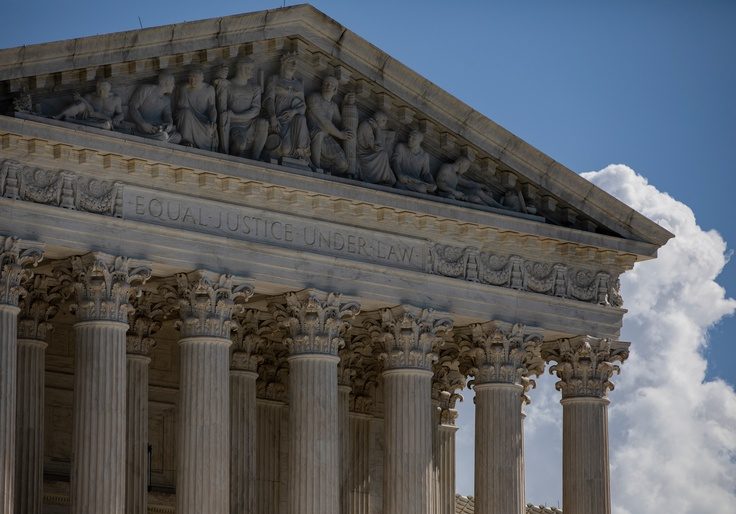The Biden administration backed law enforcement in a policing powers case before the Supreme Court on Wednesday, placing it at odds with the American Civil Liberties Union and other progressive groups.
The case involves Rhode Island police officers who entered a home for a "wellness check" on a man thought to be suicidal and confiscated his legally owned firearms. The question in the case is whether police can enter a home without a warrant to check on the elderly or mentally ill. The justices seemed to think the officers violated the Fourth Amendment by seizing the weapons, but they also sought to protect police checks for the elderly or those in a mental health crisis.
The Biden administration, which has been criticized for not doing enough on gun control, sided with the police officers. Their position put them at odds with traditional Democratic allies like the ACLU, which supports the plaintiffs and says the administration's position will lead to unconstitutional privacy violations.
The incident at the center of the case occurred in August 2015, when police conducted a "well call" check on Edward Caniglia of Cranston, R.I., at his wife's request. During a heated argument with his wife, Caniglia placed his handgun in front of her and said, "Why don't you just shoot me and get me out of my misery?" She left that evening and asked police to check on his welfare the following day.
Authorities questioned Caniglia outside the family home. Two of the officers found him calm and stable, but the ranking officer decided to summon an ambulance to take Caniglia to the hospital for an evaluation. After Caniglia was taken away, the officers entered the house and removed two handguns.
Caniglia sued the officers for monetary damages and the return of his guns, which were eventually returned to him. He notched a partial victory in a federal trial court. But the First U.S. Circuit Court of Appeals sided with the police department, ruling that the officers' wellness check did not constitute an illegal search and seizure.
On Wednesday, many of the justices doubted that police had the right to enter Caniglia's house and take his guns. But they also defended the need for police to be able to check on the elderly or help people contemplating suicide without getting hung up in red tape.
Chief Justice John Roberts asked Shay Dvoretzky, a lawyer for Caniglia, whether police officers can lawfully enter a private residence to check on an 80-year-old woman. In his scenario, neighbors called authorities because the woman was two hours late for dinner in their home.
Dvoretzky said entering the house without a warrant on that basis would violate the Fourth Amendment, which drew incredulous responses from several members of the Court.
Justice Brett Kavanaugh said Dvoretzky's response was "startling." He pressed Dvoretzky about mental health emergencies, noting that an average of 65 people commit suicide with a firearm every day.
"Time is of the essence in these cases," Kavanaugh said.
Justices Elena Kagan and Amy Coney Barrett wondered if a social worker entering a private residence for a wellness check would be bound by the same constitutional rules as a police officer. They asked if such activities could be pegged to a different kind of warrant, perhaps easier for authorities to obtain.
"Sometimes mental health checks don't go so well and people end up getting hurt," Barrett said. "Some communities are creating a situation where social workers go in. Would that be reasonable?"
The Biden administration argued in court papers that law enforcement can enter a home without a warrant if it is "reasonably necessary to protect health or safety."
Justice Neil Gorsuch criticized that position Wednesday, as did the ACLU in its legal briefs. Gorsuch said such warrantless entry didn't have a basis in founding-era principles, and he warned that practically everything the government does has something to do with health and safety.
The ACLU sounded a similar note. The founders "would not have understood the Fourth Amendment to grant a state-sanctioned 'master of all emergencies' carte blanche to enter private homes, so long as it is in the name of protecting public safety," the ACLU brief reads.
A decision in Wednesday's case, No. 20-157 Caniglia v. Strom, is expected by the summer.
